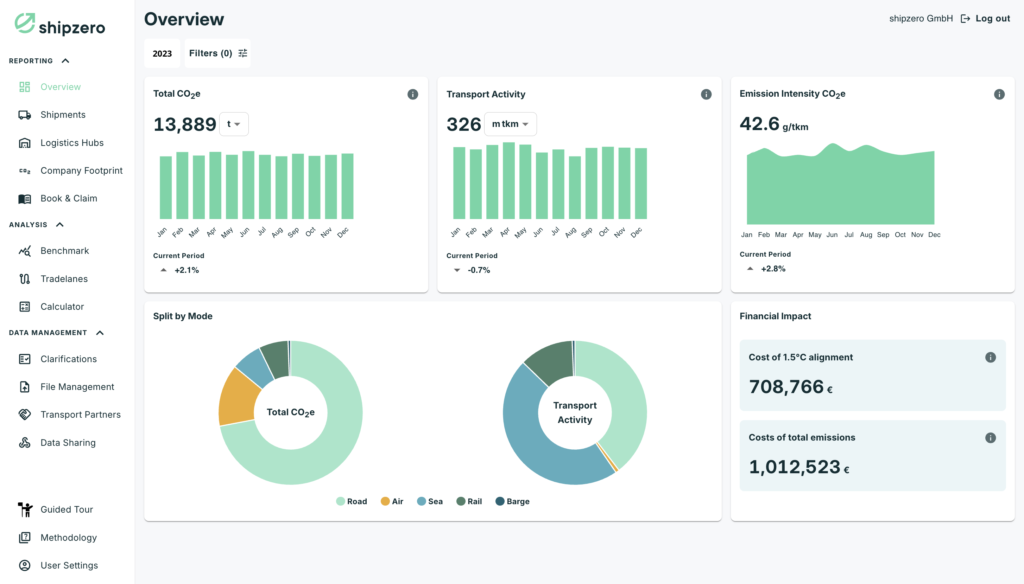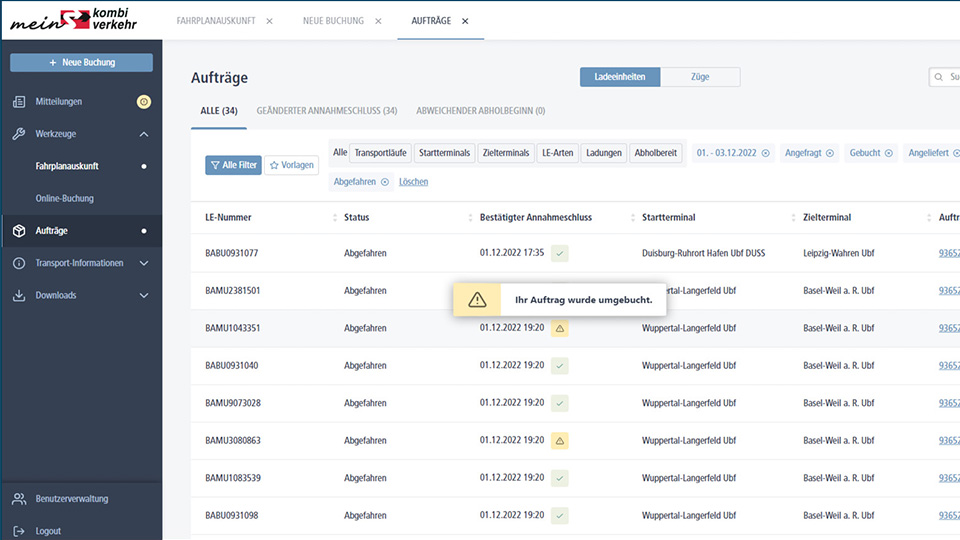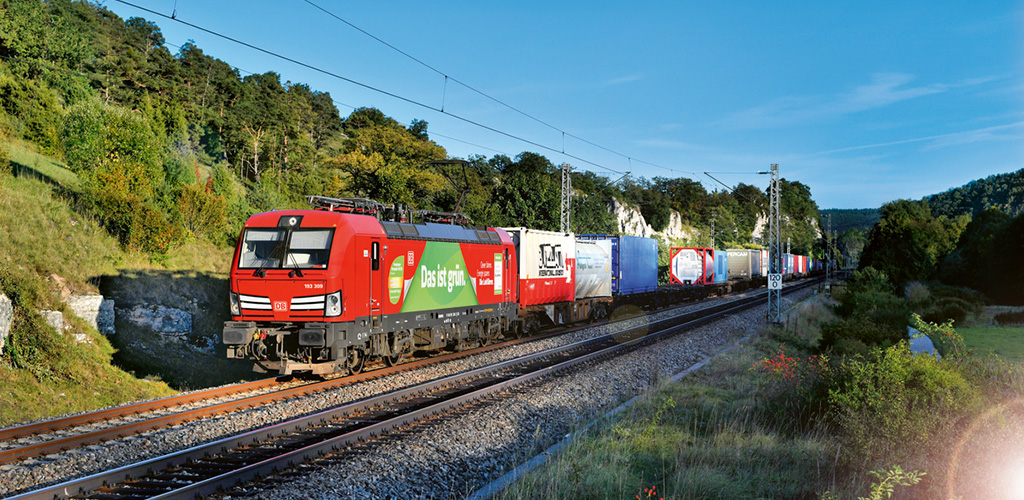This guest article by Martin Jacobs and Heiko Krebs was published in Bahn Manager, the business magazine for the railway sector.

Martin Jacobs is Director of Client Solutions at shipzero in Hamburg. 
Heiko Krebs is Managing Director of Kombiverkehr KG and is responsible for operations, network control, IT, human resources and shareholdings.
Customers of transport and logistics companies increasingly expect them to precisely document their CO2 emissions. A new partnership between intermodal operator Kombiverkehr and industry-leading emissions management platform shipzero addresses precisely this issue. The goal: to make the ecological footprint of rail transport measurable and thus usable as a strategic competitive advantage. An insight into a project that shows the industry how sustainability and economic success can be combined.
CO₂ emissions are becoming a greater focus of corporate reporting. What used to be voluntary environmental performance is increasingly becoming a mandatory reporting standard due to regulatory requirements such as the Corporate Sustainability Reporting Directive (CSRD). An ever-greater driver is the rising demands of freight forwarding companies, which are increasingly relying on rail emission values due to sustainability reporting. Shifting freight transport from road to rail has great potential in terms of sustainability. , which are increasingly reliant on rail emission values due to sustainability reporting. The shift of freight transport from road to rail holds great potential in terms of sustainability. While a truck emits an average of 119 grams of greenhouse gases per tonne-kilometre, rail freight transport emits only around 15 grams. With the progress of the energy transition and a greener energy mix, the savings potential of electrified trains is increasing even further. While Emissions data assigned to individual shipments – ideally based on actual fuel consumption – enables them to identify reduction potential and derive measures.
Data confusion complicates reporting
There are many hurdles on the path from raw data to customer-specific These are still often processed in different Excel spreadsheets from different business units or countries, which then have to be painstakingly aggregated by sustainability managers at company headquarters in a manual, tedious and error-prone process. The origin of the data transmitted to them is often unknown, and its accuracy is therefore unclear, which often leads to queries and thus costs even more time. But the challenge lies not only in collecting the data. It must be aggregated in a way that is The origin of the data transmitted to them is often unknown, making its accuracy unclear, which frequently leads to queries and thus costs even more time.But the challenge lies not only in collecting the data. It must also be consistent in order to map the entire transport chain. In addition, emissions should be calculated according to scientifically sound and internationally recognised standards and regulations. Only in this way can comparability be achieved – and thus real added value for all parties involved. In addition, emissions should be calculated according to scientifically sound and internationally recognised standards and regulations. This is the only way to ensure comparability – and thus real added value for all parties involved. Completely recording, cleaning and enriching transport data and calculating precise CO₂ emission data on the newly created basis requires not only technological expertise, but also a deep understanding of industry-specific challenges. Data quality is becoming a decisive factor.
Sustainability pioneer looking for partners
Kombiverkehr has been offering its customers emissions calculations in its timetable information since 2009, which is impressive proof of its sustainability ambitions. Due to new, increasing requirements from customers and regulators, the intermodal operator was looking for a reliable partner for emissions management and found it in shipzero. The company’s calculation methodology complies with both the authoritative GLEC (Global Logistics Emission Council) framework and the fundamental international standard ISO 14083, which are central principles for quantifying and measuring greenhouse gas emissions in multimodal and global transport chains. shipzero impressed Kombiverkehr with its technological openness, certifications and references. In this case, technological openness means, among other things, that the data specialist is able to process any type and quantity of data made available to it.
How sustainable is rail really?
Together with shipzero, Kombiverkehr has been working on a data-based answer since the beginning of 2025. Kombiverkehr is a strategically valuable partner for shipzero. On the one hand, many of shipzero’s freight forwarding customers already use Kombiverkehr as a service provider, which allows data streams to be linked. In addition, the emissions management platform can extend its focus on primary data to rail transport and, in doing so, integrate information on reporting points and exact route profiles.
The shipzero emissions data platform will be used to accurately record 100 percent of all combined transport operations in Europe in order to measure greenhouse gas emissions. The basis will be the individual trailer, container or swap body that was transported by rail between a shipping terminal and a destination terminal – often via several intermediate terminals. In this way, Kombiverkehr is converting the system of transport accounting from overall statistics, which customers previously received once a year for their transports, to order-specific accounting. In future, the emission values for the respective transport order will be made available to customers within 24 hours of completion. The data is enriched with geo-reporting points, which make the exact route of a train digitally traceable for the calculation of emissions. Especially when the actual rail route deviates from the timetable, the actual geographical route is particularly important for the correct calculation of emissions. On the Kombiverkehr side, the focus is on the CAT IT system, which is used to handle all rail transport orders. This is because the emission values provided via data exchange are linked to the transport orders that Kombiverkehr has previously sent to shipzero in anonymised form with the parameters required for the calculation. The environmental balances are transferred to downstream IT applications with customer access to the Frankfurt operator via interface solutions.In the ‘meinKombiverkehr’ portal, the company wants to show freight forwarders the emissions per transport order. Users can download the emissions data and select and prepare it according to their intended use. The shipzero emissions data platform is designed to accurately record 100 percent of all combined transport operations in Europe in order to measure greenhouse gas emissions. The basis for this will be the individual trailer, container In the ‘meinKombiverkehr’ portal, the company wants to provide freight forwarders with the emissions Users can download the emissions data and select and process it according to their intended use. The emissions balances will be provided retroactively on the basis of transports from the beginning of 2025.

Using sustainability as a business advantage
The partnership between Kombiverkehr and shipzero creates concrete advantages for various players. For freight forwarders and shippers, reporting is simplified considerably. They receive reliable emissions data directly from the transport provider and can seamlessly integrate this into their own sustainability balance sheet. For Kombiverkehr itself, there is a double benefit: the company not only meets growing customer requirements, but also strengthens its market position.
However, the relevance to the industry goes far beyond individual companies. At a time when political decisions are clearly geared towards sustainability, rail freight transport can demonstrate its environmental advantages even more clearly than before with hard figures. This could be a decisive factor in accelerating the modal shift from road to rail that politicians are striving for. In individual cases, the environmental advantage and emission transparency, in addition to the price-performance ratio, can become a differentiating factor in the competition between modes of transport. The partnership with shipzero is an important step for Kombiverkehr in establishing combined transport as a sustainable transport solution not only for existing customers, but also for potential new customers. This is not just about CO₂ reduction as an abstract quantity, but about concrete business advantages. Companies that shift their goods flows to rail or specifically market low-emission transport corridors can improve their own carbon footprint while minimising regulatory risks. The key is to link ecological and economic aspects. Sustainability offers the opportunity for a competitive advantage.

Rail wins thanks to accurate data
The cooperation between Kombiverkehr and shipzero is a prime example of how rail freight transport can turn regulatory requirements into competitive advantages. Accurate emissions data proves the environmental benefits of rail. The combination of digitalisation and sustainability will be a strategic success factor in the transport market of the future.
About shipzero
shipzero is the industry-leading data platform for effective CO2 emission reduction. Founded in Hamburg in 2018, the company helps logistics manage transport emissions, gain CO2 transparency and facilitate their path to climate neutrality with decision-oriented information based on data rather than gut feeling. The team brings together 60+ experts from the fields of data management, logistics and sustainability. shipzero tracks more than 180 million shipments in over 130 countries and specialises in the integration of primary data to ensure accurate calculation of emissions. The methodology is certified by the Smart Freight Centre, fully aligned with the international GLEC Framework 3.1 and compliant with ISO 14083 standards.
Information on the calculation of transport emissions at Kombiverkehr KG can be obtained from
Jan Weiser, Head of Corporate Communications, +49 69/7 95 05-142, jweiser@kombiverkehr.de
Image credits: shipzero GmbH, Kombiverkehr KG


Comments are closed.